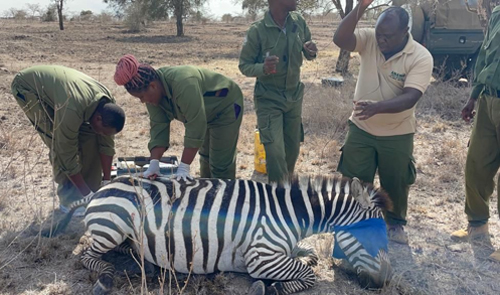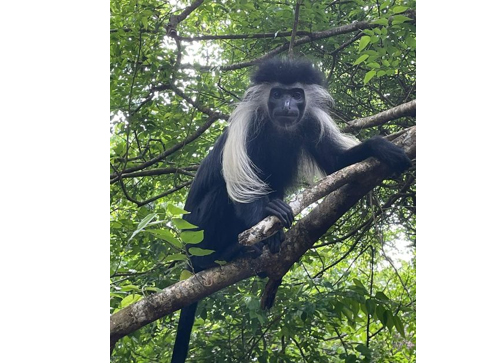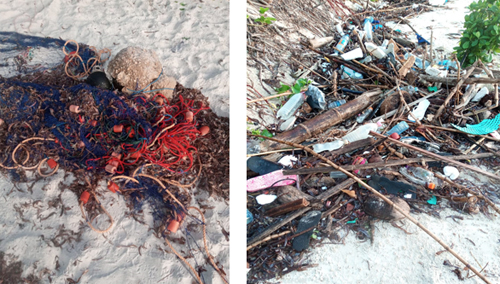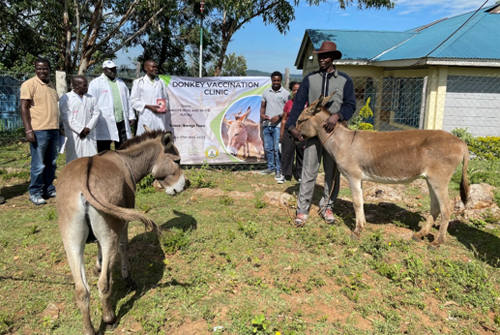Animal Welfare Monthly Updates - May 2023Communities Target Bush Meat for Sustenance and Trade in Kasigau
The ANAW and KWS Team take part in a Rescue Operation. The Project is integral under the Anti-Bushmeat Campaign Kenyan communities turn to bush meat as an accessible option for sourcing food and earning an income during tough drought season and challenging economic times. Many low-income earners source bush meat illicitly in protected and non-protected areas for subsistence and commercial purposes by trapping and killing animals using different snares, bows and arrows. In Taita Taveta, some living in the rural villages source the wildlife meat and ply the trade in Kasigau Conservancy and its environs. Kasigau Guardians have continued to respond to incidences where they confiscate pieces of dried meat at surrounding villages. They, other times, also encounter dik-dik skins during patrols. It is important to note that cases of human-wildlife conflict were on the increase towards the end of April and in the mid-May. In May, the guardians covered 25 patrol areas. The conservancy dams, water pans and boreholes had water which sustains the living conditions of both wildlife and the livestock. Our appeal to Friends of ANAW has been to help support the Guardians with GPS kits, camera and camera traps, binoculars, permanent outposts or buildings, cyber trackers, uniforms and raincoats, night visuals and thunder flashes to enhance their surveillance work. Twenty Cases Attended to at the Coastal Animal Clinic in Diani
Dill is one of the male Colobus Monkeys at the Trust Diani Beach hosts myriads of tourists who explore the ocean side and interact with the coastal community as aquatic animals inhabit the ocean yonder. At the coast, terrestrial animals find their home in the fragmented forests. Unfortunately, due to their proximity to the developed urban towns with well-maintained infrastructure, they are exposed and get hurt, or injured and require urgent medical attention due to the frequent occurrence of accidents and cases of electrocution. The Animal Welfare Clinic at Colobus Conservation, a not-for-profit conservation organisation set up to promote the conservation, preservation, and protection of primates and its coastal forest habitat, caters to these animals. In the month of May, 20 animal welfare cases were attended to, consisting of 11 Colobus, 1 Feline, 1 Civet, 5 Sykes and 2 Vervet monkeys. Consequently, 1 Colobus and 1 Sykes were treated and released back to the wild. Communities Aid in Curbing Pollution Affecting Marine Animals
Ghost Nets and Litter found along the Beach Ghost nets that drift in the ocean and lay abandoned along the beaches can be easily missed by litter pickers in dim light. The ghost nets are deemed dangerous to turtles, fish, sharks, dolphins, swooping birds, dugongs, and crocodiles among other sea creatures. The nets foster harm in fauna species by restricting movement, causing starvation, lacerations, infections and suffocation, ending up in mortality and environment degradation. It is estimated that approximately 48,000 tons of ghost nets are collected every year. As part of the litter collected, the nets were found by the Msambweni Turtle Conservation Group as they conducted beach patrols on their coastline. It was noted that there was increased amount of litter along the coastline. Beach patrols in Funzi were affected in May due to heavy rains and there were no activities reported. Litter management through beach clean ups have been able to ensure a cleaner coastline and secure nesting grounds. Through beach patrols, the Msambweni Turtle Conservation Group was able to determine some of the areas piled up with waste and make plans the next clean-up. In May, the group was able to secure new nests for the green turtles and recorded monitoring data. The eggs in the nests found were expected to hatch in July. Animal Welfare Organizations Bray in The Month of May
Celebrating National Donkey Day with Community Members in Migori County In the month of May, Africa Network for Animal Welfare (ANAW), with the support of The Brooke East Africa, and in conjunction with the Veterinary Department of Kajiado County government, conducted a successful National Donkey Day commemoration activity in Rombo, Kajiado County. The event involved carrying out community extension services and outreach for better donkey care, and a donkey health clinic that involved vaccination, wound care and general donkey management. There was also robust media engagement during the commemoration event with scribes drawn from KTN News, The Standard Newspaper, Githima TV, and Ushindi KTV running stories highlighting this year’s theme, “Donkeys Now and Tomorrow”. Further, the cross-border movement and trade of donkeys was highlighted as a threat to donkey welfare as well as an accelerant to donkey theft leaving communities who rely on the animal for sustenance desperate. It is estimated that the stories reached nearly 3 million viewers on YouTube alone - (KTN News has 2.64 million Subscribers, Githima TV has 20 thousand Subscribers, Ushindi KTV has five (5) thousand Subscribers); on Facebook, KTN News has 3.4 million followers, and the story also ran on the platform. The links are as follows:
Donkey Clinic in Migori Similarly, in May, ANAW in partnership with Migori County and WTG conducted a three-day donkey clinic in Ikerege Town, Nyabesi West and Sori Town, that saw 102 donkeys vaccinated against rabies, dewormed and their wounds attended to. Each donkey was also given a shot of multivitamin to boost their appetite. During the 3-day vaccination exercise, approximately 500 community members were engaged on the importance of upholding donkey welfare and health. The awareness and sensitization were conducted by both ANAW, the private and county local service providers as the donkeys were being attended to. Links were also established between the community members, the private and county local service providers to foster a working relationship, strengthen the referral system, collaboration, mentoring, and supervision. During the awareness sessions, 100 educational materials were distributed to community members that highlighted on donkey husbandry, health and harnessing. Support Our Work Here's a great way to support Africa Network for Animal Welfare (ANAW) to protect present and future generations of animals. You can do so through the following ways: A Donation A Legacy in Your Will |
||
